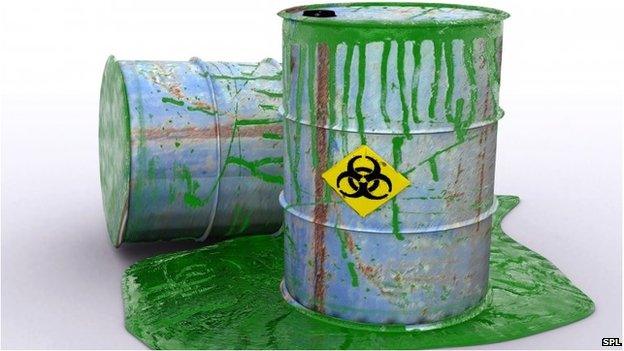The Vocabularist: How we use the word toxic
- Published

"Toxic" is a word which is rarely out of the news, as was shown this week, writes Trevor Timpson.
In its original sense it meant "poisonous".
But this week when an ex-police chief called the government's Prevent strategy - aimed at dealing with Islamist extremism - a "toxic brand", he showed how popular it is as a bit of political terminology. A very good one - for it has not become stale but still gives a lively image of something which infects and spoils what it comes into contact with.
Also this week, a newspaper headlined an interview with Alastair Campbell, external "Tony Blair is not toxic". In February, another newspaper headlined a story: "Cameron and the toxic tax-avoiding super-rich". There is a lot of alleged toxicity about.
Toxon is a very ancient Greek word for a bow. It is the ancestor of some rather jokey English words including "toxophilite" meaning archer - and the main element in a host of words in Greek covering almost every aspect of bowmanship.
There is a rambling Greek work - called Of The Marvels I Have Heard - from about the 4th Century BC which says the Celts smear their arrows with a drug (pharmakon) "which they call toxicon" - the archer's drug - and which they quickly cut out of their dead prey to stop it infecting the meat.
And as sometimes happens with a phrase, when it is shortened, the wrong part is remembered.
Just as a football match between neighbouring teams used to be called a "local Derby" and is now almost always a "Derby game", it was the archery part that came to mean "poison".
In the 1st Century BC the geographer Strabo wrote that people in Spain kept poison handy in case of need, as spies are supposed to do - and this he called "toxicon" alone.
But by that time the Romans were using it too. In a comic play by Plautus (254-184BC) a character says he will kill himself with "toxicum".
So it had become part of our general classical heritage, ready to be adapted by anyone who wanted words to do with poison.
"Toxic" in English goes at least as far back as the diarist John Evelyn in 1664. And it is still doing useful service today.
Subscribe to the BBC News Magazine's email newsletter to get articles sent to your inbox.